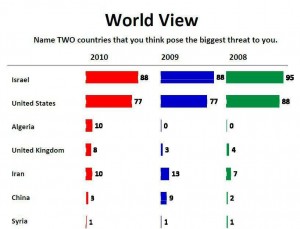
I think I gave too much credit in the previous post to the dubious notion, advanced by the Times and others, that the cables vindicate U.S. and Israeli hawkishness vis à vis Iran.
I should have just cut to the chase, as Mr. Chomsky did on Democracy Now yesterday. The dictators think one thing, and their subjects think the opposite.
So Hillary Clinton and Benjamin Netanyahu surely know of the careful polls of Arab public opinion. The Brookings Institute just a few months ago released extensive polls of what Arabs think about Iran. The results are rather striking. They show the Arab opinion holds that the major threat in the region is Israel- that’s 80. The second major threat is the United States- that’s 77. Iran is listed as a threat by 10%.
With regard to nuclear weapons, rather remarkably, a majority- in fact, 57–say that the region would have a positive effect in the region if Iran had nuclear weapons. Now, these are not small numbers. 80, 77, say the U.S. and Israel are the major threat. 10 say Iran is the major threat. This may not be reported in the newspapers here- it is in England- but it’s certainly familiar to the Israeli and U.S. governments, and to the ambassadors. But there is not a word about it anywhere. What that reveals is the profound hatred for democracy on the part of our political leadership and the Israeli political leadership. These things aren’t even to be mentioned. This seeps its way all through the diplomatic service. The cables to not have any indication of that.
When they talk about Arabs, they mean the Arab dictators, not the population, which is overwhelmingly opposed to the conclusions that the analysts here- Clinton and the media- have drawn.
Here is the summary of the poll results.
And Chomsky’s larger point? That “what this reveals is the profound hatred for democracy on the part of our political leadership”? Can’t really disagree.
That should be paired with Jack Shafer’s sharp observation in Slate yesterday:
International scandals—such as the one precipitated by this week’s WikiLeaks cable dump—serve us by illustrating how our governments work. Better than any civics textbook, revisionist history, political speech, bumper sticker, or five-part investigative series, an international scandal unmasks presidents and kings, military commanders and buck privates, cabinet secretaries and diplomats, corporate leaders and bankers, and arms-makers and arms-merchants as the bunglers, liars, and double-dealers they are.